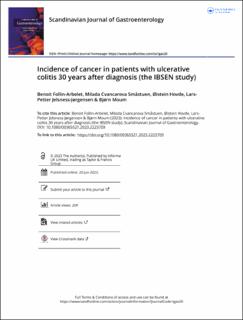| dc.contributor.author | Follin-Arbelet, Benoit | |
| dc.contributor.author | Småstuen, Milada Cvancarova | |
| dc.contributor.author | Hovde, Øistein | |
| dc.contributor.author | Jelsness-Jørgensen, Lars-Petter | |
| dc.contributor.author | Moum, Bjørn Allan | |
| dc.date.accessioned | 2023-08-08T14:39:11Z | |
| dc.date.available | 2023-08-08T14:39:11Z | |
| dc.date.created | 2023-07-11T12:37:14Z | |
| dc.date.issued | 2023-06-20 | |
| dc.identifier.citation | Scandinavian Journal of Gastroenterology. 2023. | en_US |
| dc.identifier.issn | 0036-5521 | |
| dc.identifier.uri | https://hdl.handle.net/11250/3083081 | |
| dc.description.abstract | Objectives
Patients with ulcerative colitis (UC) have shown an increased risk for colorectal cancer, hepatobiliary, hematologic, and skin cancers, but updated long-term data is needed. This study aimed to estimate the risk of cancer in patients with UC compared to the general Norwegian population, in a population-based cohort (the IBSEN study), 30 years after diagnosis; and to identify possible risk factors associated with cancer.
Methods
The IBSEN cohort prospectively included all incident patients between 1990 and 1993. Cancer incidence data were obtained from the Cancer Registry of Norway. The overall and cancer-specific hazard ratios (HR) were modelled using Cox regression. Standardized incidence ratios were estimated compared to the general population.
Results
In total, the cohort included 519 patients, and 83 cases were diagnosed with cancer. There was no statistically significant difference in the overall cancer risk (HR = 1.01, 95% CI: [0.79–1.29]) and colorectal cancer risk (HR = 1.37, 95% CI: [0.75–2.47]) between patients and controls. The incidence of biliary tract cancer was higher than expected (SIR = 9.84, 95%CI: [3.19–20.15]), especially when UC patients suffered from primary sclerosing cholangitis. Male UC patients were also more at risk of being diagnosed with hematologic malignancies (HR = 3.48, 95% CI: [1.55–7.82]). Being prescribed thiopurines was associated with a higher risk of cancer (HR = 2.03, 95% CI: [1.02–4.01]).
Conclusions
At 30 years after diagnosis, the risk of all cancer in patients with UC was not significantly increased compared with the general population. However, the risks of biliary tract cancer and hematologic cancers were increased, particularly in male patients. | en_US |
| dc.language.iso | eng | en_US |
| dc.publisher | Taylor & Francis | en_US |
| dc.rights | Navngivelse 4.0 Internasjonal | * |
| dc.rights.uri | http://creativecommons.org/licenses/by/4.0/deed.no | * |
| dc.subject | inflammatory bowel disease | en_US |
| dc.subject | ulcerative colitis | en_US |
| dc.subject | colorectal cancer | en_US |
| dc.subject | biliary tract cancer | en_US |
| dc.subject | thiopurines | en_US |
| dc.title | Incidence of cancer in patients with ulcerative colitis 30 years after diagnosis (the IBSEN study) | en_US |
| dc.type | Peer reviewed | en_US |
| dc.type | Journal article | en_US |
| dc.description.version | publishedVersion | en_US |
| dc.subject.nsi | VDP::Medisinske Fag: 700::Klinisk medisinske fag: 750::Gasteroenterologi: 773 | en_US |
| dc.subject.nsi | VDP::Medisinske Fag: 700::Klinisk medisinske fag: 750::Onkologi: 762 | en_US |
| dc.source.journal | Scandinavian Journal of Gastroenterology | en_US |
| dc.identifier.doi | 10.1080/00365521.2023.2223709 | |
| dc.identifier.cristin | 2161957 | |
| cristin.ispublished | true | |
| cristin.fulltext | original | |
| cristin.qualitycode | 1 | |

